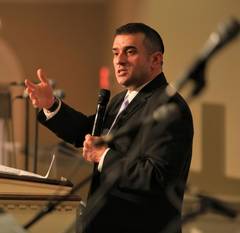- About Us
- Learning
- Resources
- Get Involved
- Membership
- Jobs
Better the handle than the blade
04/16/2019 11:38:45 AM
| Author | |
| Date Added | |
| Automatically create summary | |
| Summary |
 There are journeys that our souls, collective and individual, need to take. Every year, the Jewish calendar comes to help us take those journeys.
There are journeys that our souls, collective and individual, need to take. Every year, the Jewish calendar comes to help us take those journeys.
Right now, we are just a few weeks past Purim, a tale of politics and power masquerading as a children's holiday with costumes and cookies.
An enemy tried to kills us, but we turned the tables and killed our enemies instead. The story says it plainly in Esther 9:5 - "Jews smote all their enemies with the stroke of the sword, with slaughter and destruction, and did what they would unto them that hated them." This is the story of Esther - violence evaded and subverted, and in its telling, the Jews of the story give voice to our painful lesson - if there is violence to be done, it is better to be holding the handle of the sword than facing the blade.
Our journey through the calendar begins with Purim, in part to acknowledge that we Jews have been shaped by violence visited upon us, and that for better and for worse, our collective psyche has been shaped to ensure that we are not again vulnerable to violence.
However - and this is the crucial part - the cycle doesn't end with Purim. Confronting the violence we have faced is certainly part of our journey, but it's not the endpoint.
One month after Purim, we move to Pesach. Pesach is another story of oppression - the Egyptians enslave us, and through human bravery and Divine deliverance we are liberated. However, our stories don't imagine us turning around and enslaving our oppressors the way they enslaved us. In fact, part of the rabbinic tradition decries even celebrating the death of the soldiers who chased us through the Red Sea.
Somewhere on the journey from Purim to Pesach, we learn there is an even better path than reversing the violence to be visited on us. We remember that we can subvert a system of violence altogether and imagine a world in which nobody is oppressed - not us and not our oppressors either.
Our calendar doesn't end with Pesach, however.
Starting on the second night of Pesach, we journey 49 days towards Shavuot to reap the true fruits of political liberation. On its face, Shavuot celebrates receiving the Torah at Mt Sinai, and if Purim is about escaping violence and Pesach is about escaping a cycle of violence, then perhaps Shavuot is about escaping from the mental slavery that keeps us chained to questions of violence and retribution.
Rav Abraham Isaac Kook, the first chief rabbi of modern Palestine, said that the evil deeds of the past continue to reverberate into the present untill we learn to tell a new story.
Shavot is about doing just that. Shavuot is the moment when, free from oppression, we can determine - we have to determine - what sort of human being we want to be?
Shavuot is when we refuse to be defined by circumstance, but consider what the reality of our own existence demands of us.
The Torah is the path we walk to get to who we need to be. Will we live a Torah that allows us to have peace in the fortresses of our souls? Will we live a Torah of rest and stillness for one day out of seven? Will we live a Torah that honors the poor, and their maker as well?
Shavuot is the holiday when we can reach past the violence that we have suffered and we have perpetrated, reach back to the Torah that is the origin of our people and determine not where we have been, but where we are going.
This is our journey - from avoiding oppression on Purim, to subverting a system of oppression on Pesach, to writing a new story, free from the dynamics of violence, on Shavuot. From now to then is when we can write our script anew.
Wed, November 5 2025
14 Cheshvan 5786
RABBI BRENT SPODEK

Join Our Mailing List
Privacy Settings | Privacy Policy | Member Terms
©2025 All rights reserved. Find out more about ShulCloud


